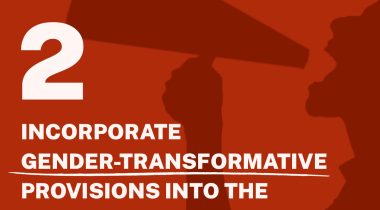TJN Admin ■ The UK must face up to the gender inequality it enables internationally

Co-written by the Tax Justice Network and Oxfam GB

The United Kingdom is currently being reviewed by the United Nations (UN) on how well it is meeting its commitments on women’s gender equality rights guaranteed by the Convention on the Elimination of All Forms of Discrimination against Women (CEDAW). This review includes evaluating how the UK has failed to prevent many of its Crown Dependencies and Overseas Territories from becoming some of the largest tax havens in the world.
The UK has a disproportionate influence on financial transparency and tax policies globally because of the Overseas Territories and Crown Dependencies — a network of secrecy jurisdictions which it supports and over which it has ultimate sovereignty. While the UK has made some domestic progress by improving transparency on who owns companies in the UK, its territories still refuse to publish such information. After intense campaigning within the UK parliament supported by a range of NGOs, the UK government agreed that it would require the Overseas Territories to implement a key transparency measure by the end of 2020, or else have it imposed.
Meanwhile, the UK-linked tax havens continue to offer low or zero corporate, personal, and capital gains tax rates to companies and individuals. This has the effect of concentrating wealth and perpetuating income inequality within and between countries. Developing or fragile states are very often the greatest losers as multinational corporations and high net worth individuals funnel profits and wealth through or in tax havens.
For several years, the CEDAW Commission, charged with reviewing this aspect of UK governance, has insisted that the UK is responsible for ensuring that its own transnational tax laws and those of its Crown Dependencies and Overseas Territories must not detract from or impair women’s rights to gender equality. The UK is not the first country that the Committee has raised tax policy and financial secrecy issues with. In 2016, following submissions from civil society and academic researchers, the Committee found that the international impact of Switzerland’s tax and financial secrecy laws contravened its gender equality obligations to women affected by those laws. In the Commission’s Concluding Observations, it recommended that Switzerland change its tax laws to stop impairing women’s rights abroad, and to take steps to ensure that all future trade and investment agreements preclude such harmful tax practices.
So, what is the link between tax havens and women’s rights?
First, feminists have long argued that the fulfilment of women’s rights will take more than a sense of fairness and equity – it requires funding too. This includes funding of vital public services, like education and health, and infrastructure, such as water, electricity and transportation. Underinvestment in these services exacerbates deeply entrenched, structural gender inequalities. Women and girls, for instance, are often the first to miss out on education or are prevented from accessing life-saving maternal healthcare. Societies rely on women and girls to shoulder a significant amount of unpaid care and domestic work – tasks such as fetching water, cooking, and caring for children and relatives. All of these are made more arduous and time consuming without investment in services, leaving women with less time.
Second, countries that haven’t been able to raise enough revenue from businesses through corporate income taxes often have to resort to implementing higher taxes on working people through income tax or value added taxes (VAT), or through myriad fees and special charges paid only by local residents. Women living in poverty, who on average are on lower incomes than men, are doubly disadvantaged because they are disproportionately using more of their income to pay for goods and services that attract VAT, consumption taxes, and local fees.
At the end of the CEDAW review, the Committee will issue its report on the UK, and may make findings on where the UK’s tax practices are undermining the rights of women domestically and internationally. We have four recommendations:
First, the CEDAW Commission can recommend that the UK Government ensure that all its Crown Dependencies and Overseas Territories ratify CEDAW without reservations.
Second, the UK government must ensure implementation of public registers of beneficial ownership of companies in the Overseas Territories as required in the Sanctions and Anti-Money Laundering Act 2018. The Crown Dependencies that need to urgently make transparency reforms must be required to follow suit.
Third, the UK government needs to acknowledge and redress the wider impacts of its tax havens on women’s rights. The influence of the tax havens is global, and the UK government should analyse how zero corporate tax rates and related policies drive a race to the bottom leaving governments with unenviable choices between cutting vital public services disproportionately needed by women or increasing taxes which are disproportionately borne by women.
Lastly, the UK government should commission an independent and holistic analysis of how its network of Overseas Territories and Crown Dependencies violates women’s human rights and impairs the development opportunities that more diverse economies can generate (sometimes referred to as ‘spillover analysis’).
Detailed analysis should examine the role played by the UK’s tax haven network on taxable financial flows around the globe to understand more precisely the overall effects of these tax havens’ policies and practices on the rights of women.
Women’s rights activists around the world have been rallying for tax justice and for the progressive fiscal systems that are needed to support gender equality. The UK can and should choose to gear its tax policy towards making progress on women’s rights at home and around the world. This will require political will and a refocusing of current tax and financial transparency laws, policy and regulation in order to mitigate the harmful impact of Crown Dependencies and Overseas Territories financial secrecy and compliance policies.
The CEDAW Review timetable for United Kingdom presents a further opportunity for the submission of issues:
72 Pre-Sessional Working Group (23 Jul 2018 – 27 Jul 2018).
‘The pre-sessional working group draws up lists of issues and questions with regard to State party reports which the Committee will consider two sessions later, focusing on major areas of concern with regard to the implementation of the Convention by the States parties concerned.
Representatives of the specialized agencies and bodies of the United Nations, national human rights institutions as well as national and international non-governmental organizations, are invited to provide country-specific information to the pre-sessional working group on those States parties whose reports are before the group’
The Tax Justice Network’s submission of list of issues addressed to the UK Government.
‘The lists of issues and questions are intended to facilitate the preparation by States parties for their constructive dialogue with the Committee and to provide a focus for the dialogue. The list of issues normally consists of 20 questions with each question containing no more than 3 issues’
Addendum: UK Government’s Replies to the List of Issues submitted 16 November, 2018
72 Session: Deadline for submissions 28 January 2019 (18 Feb 2019 – 08 Mar 2019) Consideration of State Reports.
More on the CEDAW Committee’s working methods can be found here.
Related articles
The elephant in the room of business & human rights
UN submission: Tax justice and the financing of children’s right to education
14 July 2025
One-page policy briefs: ABC policy reforms and human rights in the UN tax convention
Tax justice pays dividends – fair corporate taxation grows jobs, shrinks inequality
UN Submission: A Roadmap for Eradicating Poverty Beyond Growth
A human rights economy: what it is and why we need it

Do it like a tax haven: deny 24,000 children an education to send 2 to school

Incorporate Gender-Transformative Provisions into the UN Tax Convention
Just Transition and Human Rights: Response to the call for input by the Office of the UN High Commissioner for Human Rights
13 January 2025


